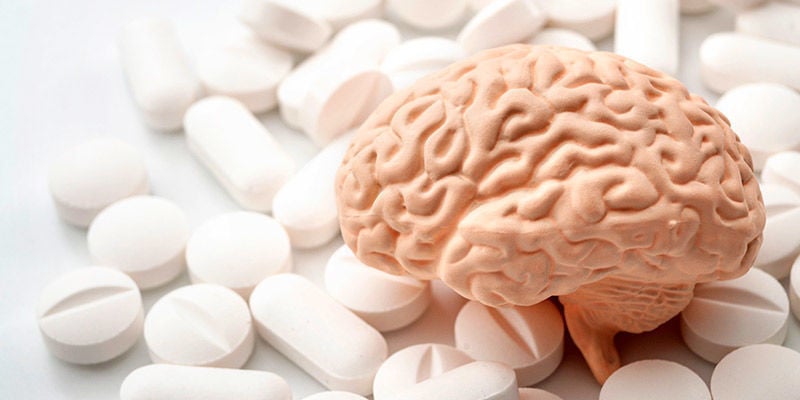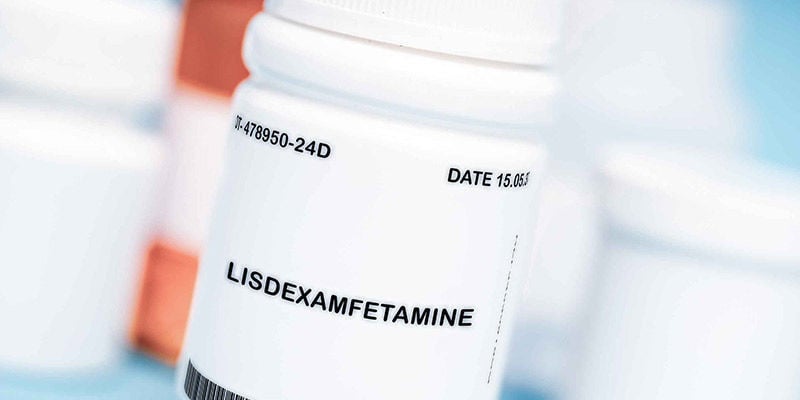
Are Study Drugs Helpful?
Study drugs can seem like an easy option when a large task is looming. However, while they do stimulate the mind, the ways in which they do so aren't always helpful. Here we explore the most popular study drugs, including their desired effects as well as their side effects, and determine just how useful they are for the majority of individuals.
Whether you have exams looming or you’ve got a large backlog at work, it would be great if you could just take a pill and fly through your tasks with superhuman ability. Many people try to do this with the aid of study drugs, aka smart drugs, and are met with mixed results.
While some people swear by these drugs, others find they decrease focus, ruin their ability to perform complex tasks, and make them generally a little uncomfortable. But what are study drugs, and what do they actually do? Here we take a look, and ask if they’re worth taking.
What are study drugs?

Study drugs aren't an official category of drug. Rather, they are a collection of different drugs that people use, usually illicitly, as study aids. Perhaps most common on university campuses, these drugs are said to increase focus and the amount of time a person can stay focused for. In most cases, these drugs are stimulants of some sort, though this is not always the case.
Study drugs may also be used in the workplace, although this is less common. Despite their name, the effects usually make focusing on simple, dull tasks easier, but can actually impair complex thinking and memory in most people.
What are study drugs prescribed for?

The original study drugs were Adderall and Ritalin, two amphetamine derivatives prescribed to treat ADHD. In short, the thinking goes that if they help people with ADHD focus, then they should help anyone focus, right?
Well, the reality is more complex. People with ADHD have a lower than usual baseline of dopamine, which can make focusing hard. Stimulants increase the amount of dopamine in the brain, which for people with ADHD can bring them to a state in which it is easier to focus. For neurotypical people, the baseline of dopamine should be sufficient for focus, and increasing it can actually make learning more challenging.
Aniracetam, on the other hand, is prescribed for those with dementia or who have suffered a stroke, as it is thought to improve memory and cognitive function. Meanwhile, modafinil, another famous study drug, is prescribed to treat narcolepsy, as it is a stimulant that increases wakefulness.
So while study drugs differ, they share the similarity of being prescribed to improve or increase cognitive function in some way.
What are the different smart drugs?

Now, let’s take a look at some of the most common smart drugs available. You’ve likely heard of some of these—you may have even taken some.
Note: All effects listed here regard the desired effects when a drug is legitimately prescribed. Effects can differ significantly if you take these drugs in a different context.
Adderall

Adderall, a famous ADHD medication, is the brand name for a combination of four amphetamine salts. This drug has been prescribed over 34 million times in the US and is wildly popular—many say too popular. As it is easily accessible in the US and Europe, it is a popular study drug, and a performance enhancer for physical activities too.
If taken at low doses for ADHD, it has a low risk threshold regarding addiction and shouldn’t damage the brain or nerves. At higher doses, this is not the case.
Effects
-
Heightened wakefulness
-
Change in sex drive
-
Greater cognitive control
-
Fatigue resistance
-
Increased strength and endurance
Side effects may include:
-
Anxiety
-
Dry mouth
-
Difficulty focusing
- Insomnia
Aniracetam

Aniracetam is less commonly used as a study drug, as it is much harder to obtain. In the US, it is not approved by the FDA but it is available in Europe for dementia and strokes. For these uses, it has been shown to improve memory and cognitive ability.
Effects
-
Improved memory
-
Improved learning
Side effects may include:
-
Irritability
-
Anxiety
- Insomnia
Methylphenidate (Ritalin, Concerta)

Aside from Adderall, perhaps the other most famous study drug is Ritalin, which also goes by the name Concerta. Both of these are brand names for the amphetamine methylphenidate. Like Adderall, this drug is very easy to get hold of and so it is very popular among students and others who may wish to use smart drugs.
Effects
-
Increased wakefulness
-
Heightened in sex drive
-
Greater cognitive control
-
Increased physical capabilities
Side effects may include:
-
Irritability
-
Anxiety
- Palpitations
Lisdexamfetamine

Lisdexamfetamine, sold under the brand names Vyvanse and Elvanse, is another stimulant prescribed to treat ADHD and binge eating disorders, as it decreases appetite.
Effects
-
Increased wakefulness
-
Greater cognitive control
-
Increased physical capabilities
Side effects may include:
-
Insomnia
-
Irritability
-
Anxiety
- Palpitations
Modafinil

Modafinil promotes wakefulness and is thus used mainly to treat narcolepsy. While it is also a common study drug, research suggests that, though effective for sleep-deprived individuals, it has limited effects for people who are well rested (Minzenberg and Carter, 2008).
Effects
-
Increased wakefulness
-
Improved focus
-
Improved cognitive abilities
-
Better memory
Side effects may include:
-
Anxiety
-
Headache
-
Nausea
- Nervousness
Caffeine

Last but not least, the most popular study drug that most of us don’t even deem a drug: caffeine. Caffeine is a stimulant with very similar effects to all of the others on this list. The main difference is that it’s available at cafes and markets, rather than requiring a doctor’s prescription. While this makes it less exciting for some, it also makes it more convenient!
Effects
-
Increased wakefulness
-
Greater focus
-
More energy
Side effects may include:
-
Anxiety
-
Jitters
-
Trouble focusing
-
Irritability
- Headache
Should you use study drugs?

Unless you have a diagnosed condition that somehow impairs your cognitive ability, you can probably do without study drugs—or just stick to coffee. The efficacy of each is uncertain and there’s plenty of evidence to suggest that many people will experience anxiety and disrupted focus when using these drugs.
Most study drugs are strong psychoactive stimulants, and as such should be treated accordingly. They are not magical drugs that make us smarter—they are drugs that activate the nervous system and increase the speed at which our brains operate. This does not always mean that they operate more efficiently.
Think of it like driving a car; there’s an optimal speed at which you can get to your destination in good time while also maintaining full control. Go above that, and things get a little shaky! So while stimulant drugs may help some, nothing beats a happy, sober, and well-rested brain if you want to learn or perform a complex task.
What are the risks and side effects of study drugs?

Study drugs, as they’re usually stimulants, do come with certain risks. Alongside the side effects listed above, study drugs have the potential to be abused—most are amphetamines, after all. At the very least this can hamper your learning, and at most it can lead you to behave in a disinhibited manner or develop a dependence. These dangers become particularly severe if you have to drive or do anything else that puts others in danger.
Moreover, if you have underlying mental or physical health conditions, then these drugs may trigger those in unexpected ways, and can sometimes even be fatal. Finally, if you’re on any prescription drugs, for mental or physical health, do not mess with study drugs, as they may have harmful interactions.
Study drugs: Help or hindrance?

For most people, study drugs are unnecessary. They’re certainly not the mind-enhancing compounds many wish they were. In most cases, they're similar to turbo-charged caffeine and can be used for an extra boost sometimes—but they aren’t going to turn you into a genius.
If you find they work incredibly well for you, it may be that you have undiagnosed ADHD, as some people with ADHD respond well to such stimulants. Otherwise, get a good night’s sleep and drink some water!
- Minzenberg, Michael J, Carter, & Cameron S. (2008, June). Modafinil: A Review of Neurochemical Actions and Effects on Cognition - https://www.nature.com
-
 3 min
26 June 2023
Using Magic Mushrooms For Studying: Does It Help?
When exam period approaches, it can be tempting to turn to drugs to assist us in our studies. But how can you use them in a way that actually helps? In this article, we delve into the topic of...
3 min
26 June 2023
Using Magic Mushrooms For Studying: Does It Help?
When exam period approaches, it can be tempting to turn to drugs to assist us in our studies. But how can you use them in a way that actually helps? In this article, we delve into the topic of...
-
 5 min
29 June 2021
What Are The Effects Of Caffeine On Studying?
If you're wondering how to use caffeine to maximise your studying potential, then you've come to the right place! As with all drugs, there are optimal amounts that make good results more likely....
5 min
29 June 2021
What Are The Effects Of Caffeine On Studying?
If you're wondering how to use caffeine to maximise your studying potential, then you've come to the right place! As with all drugs, there are optimal amounts that make good results more likely....
-
 6 min
12 January 2020
A Definitive Guide To The Cognitive Effects Of Psychedelics
Many people know that psychedelics can influence how we think and feel. Below, we break down the different cognitive effects of psychedelics, and explore various enhancements and suppressions in...
6 min
12 January 2020
A Definitive Guide To The Cognitive Effects Of Psychedelics
Many people know that psychedelics can influence how we think and feel. Below, we break down the different cognitive effects of psychedelics, and explore various enhancements and suppressions in...
-
 4 min
31 August 2017
5 Drugs That May Boost Focus, Enhance Concentration And Help...
Tired of sitting down at your work desk only to find your boredom levels increase and your attention drift off into some distant corner of the internet? Well, this list of drugs may be able to help...
4 min
31 August 2017
5 Drugs That May Boost Focus, Enhance Concentration And Help...
Tired of sitting down at your work desk only to find your boredom levels increase and your attention drift off into some distant corner of the internet? Well, this list of drugs may be able to help...
-
 4 min
11 August 2017
The Pros (And Cons) Of Using Cannabis For Studying Or Training
Cannabis use has long been assumed to sustain negative effects on memory, learning and mental performance. However, recent findings prove that this is not always the case. Many individuals actually...
4 min
11 August 2017
The Pros (And Cons) Of Using Cannabis For Studying Or Training
Cannabis use has long been assumed to sustain negative effects on memory, learning and mental performance. However, recent findings prove that this is not always the case. Many individuals actually...
-
 2 min
15 November 2014
The Long-Term Effects of Peyote Use on the Brain
Peyote has been used for entheogenic practices for thousands of years - but what effect does such use have on the brain?
2 min
15 November 2014
The Long-Term Effects of Peyote Use on the Brain
Peyote has been used for entheogenic practices for thousands of years - but what effect does such use have on the brain?













 United States
United States










